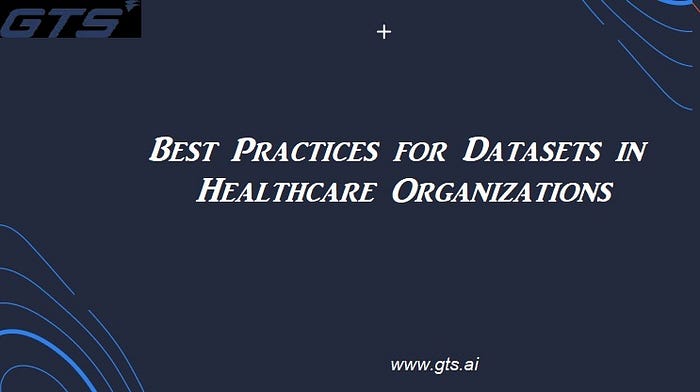Best Practices for Datasets in Healthcare Organizations
Healthcare organizations are increasingly reliant on data to inform decision-making, improve patient outcomes, and drive innovation. However, the effective use of healthcare data requires careful management and attention to best practices to ensure that data is accurate, accessible, and secure.

In this blog post, we will explore some of the best practices for datasets in healthcare organizations.
- Define Data Governance Policies and Procedures
Effective data governance is a critical component of data management in healthcare organizations. This includes developing policies and procedures for data collection, storage, analysis, and sharing. Organizations should establish clear guidelines for data ownership, data quality, and data security, and ensure that all staff members are trained on these policies.
2. Ensure Data Accuracy and Quality
Accurate and high-quality data is essential for effective decision-making in healthcare. Organizations should establish processes for data validation and data cleaning, and regularly monitor data to ensure that it remains accurate and up-to-date. This may involve implementing automated data checks or manual data audits and may require collaboration across departments to ensure that data is consistent and reliable.
3. Maintain Data Security and Privacy
Healthcare data is highly sensitive and must be protected to ensure patient privacy and compliance with legal and regulatory requirements. Healthcare organizations must establish robust data security protocols and invest in secure data storage and transmission technologies. This may involve encrypting data, limiting access to sensitive data, and regularly auditing data access logs to detect potential breaches.
4. Foster a Data-Driven Culture
To fully realize the benefits of healthcare data, organizations must foster a culture of data-driven decision-making. This may involve investing in data analytics tools and technologies, developing dashboards and reports to make data accessible to staff members and providing training to staff members on data analysis and interpretation. Additionally, organizations should establish data-driven performance metrics to track progress toward key goals and ensure that data is integrated into strategic planning processes.
5. Develop Cross-Functional Collaboration
Effective data management in healthcare requires collaboration across departments and disciplines. Organizations should establish cross-functional data teams to facilitate data sharing and ensure that data is aligned with organizational goals. This may involve establishing data governance committees, data analytics working groups, and cross-functional data quality improvement teams.
6. Leverage External Data Sources
Healthcare organizations can benefit from leveraging external data sources to supplement internal data. This may involve integrating data from public health agencies, academic research institutions, or other healthcare organizations. This can provide organizations with valuable insights into industry trends, best practices, and new research findings, and can help to inform strategic decision-making.
7. Implement Agile Data Management Practices
Effective data management in healthcare requires a flexible and agile approach to data collection, analysis, and sharing. Healthcare organizations should consider adopting agile data management practices, such as rapid prototyping, iterative development, and continuous improvement. This can help organizations respond quickly to changing industry conditions and ensure that data remains relevant and up-to-date.
Conclusion
Effective data management is a critical component of healthcare organizations’ ability to provide high-quality care, drive innovation, and meet regulatory requirements. By adopting best practices for datasets, organizations can ensure that data is accurate, accessible, and secure, and can leverage data to improve patient outcomes and achieve organizational goals. By establishing data governance policies and procedures, ensuring data accuracy and quality, maintaining data security and privacy, fostering a data-driven culture, developing cross-functional collaboration, leveraging external data sources, and implementing agile data management practices, healthcare organizations can effectively manage their data and drive positive change in the healthcare industry.
Datasets and GTS
The impact of data on the healthcare sector is evident. Integration is becoming increasingly important to reap the rewards that data can offer the enterprise as big data transformation strategies like IT modernization and cloud environments take the lead. That’s why we at Globose Technology Solutions aim to provide the best quality Healthcare datasets for your AI/ML models. We are experienced and have enough expertise to complete any sort of project.



Comments
Post a Comment